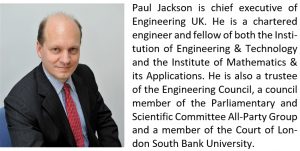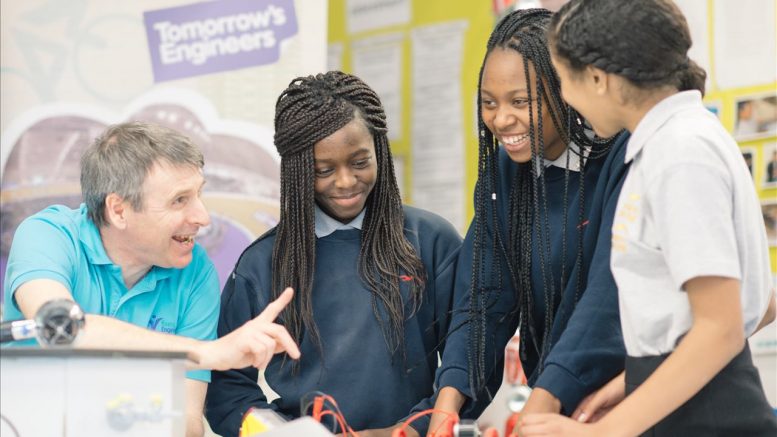Engineering is a wide ranging and hugely productive industry, generating 27 per cent of total United Kingdom GDP. The industry employs more than 5.5 million people and supports 14.5m jobs overall.
There can be no doubt that engineering makes a significant contribution to the UK economy and its productivity – as well as working towards mitigating such global challenges as climate change, food production, clean water and energy.
Yet, despite the positive contribution to the economy, to employment and to productivity, the gap between supply and demand for people with engineering skills is still wide enough to trigger concern. The engineering industry has huge potential for continued growth, but success relies on a workforce with the right skills at the right level.
The forecast annual demand for engineers and technicians is about 182,000 which, given the current stock of engineers coming through the UK education system, could mean an annual shortfall of 69,000 employees. This presents a significant challenge.
Part of that challenge is developing a better public understanding of 21st century engineering.
Public attitudes to engineering have changed dramatically over the past five years, with 65 per cent of the UK population able to name which engineering developments in the past 50 years have had the most impact on their lives. Unsurprisingly, the internet came out top, with developments in computers a close second. This is a massive improvement since 2010, when the same question could only be answered by 38 per cent of respondents.
We must invest in the future, the options are clear – either we lead from the front or fall behind
It is engineers that are driving the ‘fourth industrial revolution’, which is transforming our daily lives on so many levels. For example, working with retail technology experts recently showed me what shopping in the future might entail – virtual reality changing rooms, artificial intelligence (AI) shop assistants and drone delivery. The pace of development is unprecedented.
Software engineers and those innovators who conceive and create much of the new technology we take for granted are rarely who people think of when they think of engineers. That needs to change. Not because mechanical or civil engineering have been consigned to history, far from it, but because the roles and careers available in engineering are constantly evolving and are more innovative than ever before, even within those ‘traditional’ industry sectors.
During this month’s Tomorrow’s Engineers Week, companies, professional institutions, educators and many individual engineers shone a spotlight on the industry. They highlighted – through events, articles, films and social media – the broad range of jobs young people can do with science, technology, engineering and maths (STEM) skills. In sharing their stories they may well have sparked the imagination of a future engineer.
November also marked the third anniversary of the Perkins Review, which looked at the need to equip people with the right STEM skills to compete in the global economic race. The report kicked off lots of different work streams – focusing not just on sending out leaflets, but really engaging people, to give them a taste of what a STEM career could entail.
At EngineeringUK our work has focused on two key strands – Big Bang and Tomorrow’s Engineers – through which the engineering community last year reached more than 400,000 young people and 48 per cent of all UK secondary schools.
The Big Bang UK Young Scientist and Engineers Fair is the annual flagship event, bringing together hundreds of companies and organisations and thousands of volunteers to bring STEM to life for the 70,000 visitors who come through the doors of the NEC in Birmingham each March. This four-day extravaganza is complemented by a series of regional fairs, as well as micro-events that take place in schools, colleges and commercial venues throughout the year.
Tomorrow’s Engineers aims to ensure no talent is wasted. It is led by the engineering community, and that collective ownership and collaborative spirit make it unique. It doesn’t offer a single off-the-shelf package, dictate how individual employers or schools should get young people engaged, or work on the premise that one-size-fits-all. Tomorrow’s Engineers provides a platform for employers to grow the talent pipeline as part of a co-ordinated drive.
The young people that have taken part in both Big Bang and Tomorrow’s Engineers agree that a ‘career in engineering is desirable’ to a much larger extent than the national average, showing that the profile for engineering careers is getting stronger. We need to build on that.
A growing network of employers is working to realise the ambition of reaching one million young people a year with a memorable experience of engineering in action. Tomorrow’s Engineers brings a strategic approach to schools engagement, building links with industry and schools, meaning employer outreach extends to where the need and potential impact are greatest.
If we can get it right and work together to build that talent pipeline it won’t just mean a significant contribution to the UK, but it will also secure a leading global role in the fourth industrial revolution. We must invest in the future, the options are clear – either we lead from the front or fall behind.
By Paul Jackson





